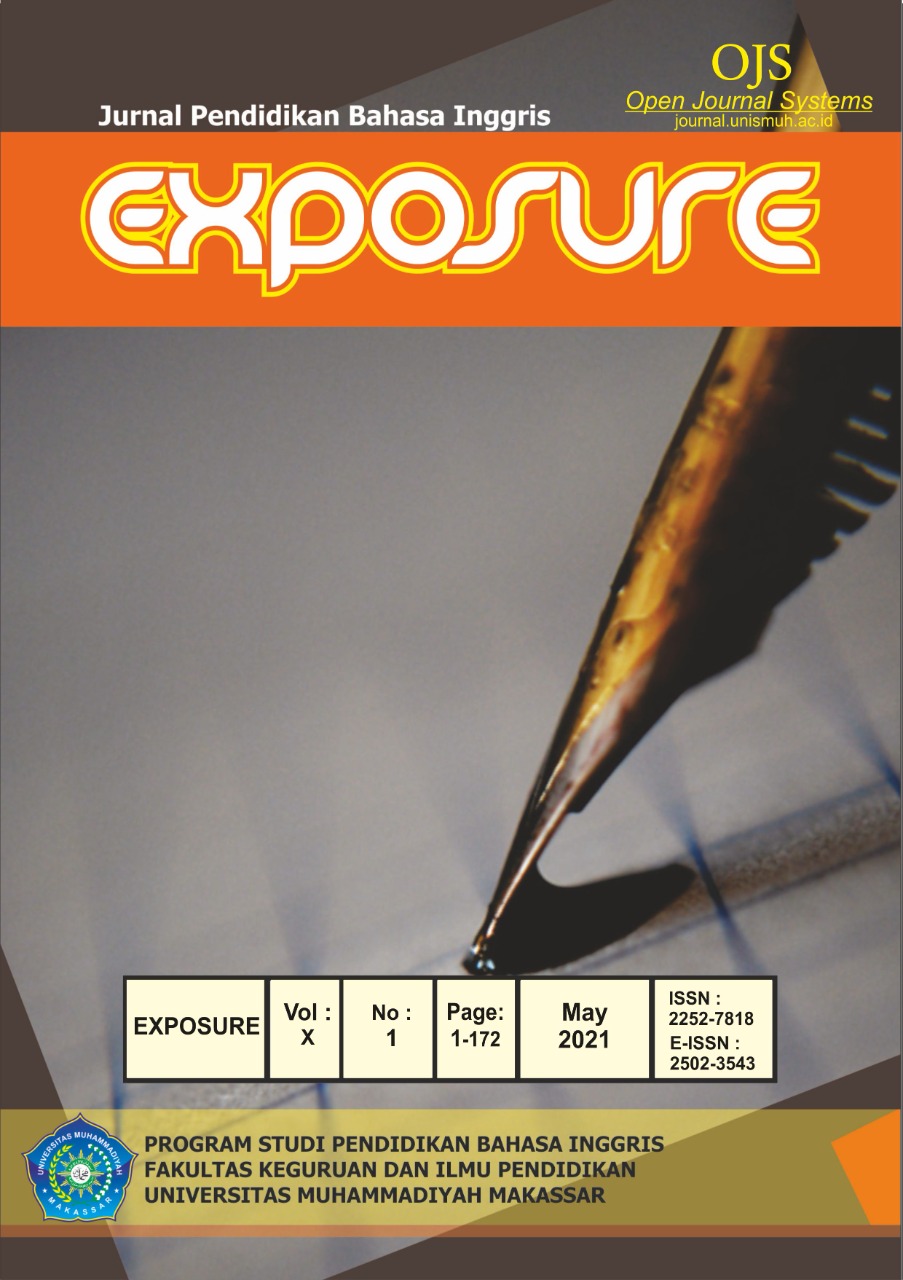THE MEANING OF THE PHILOSOPHY WISE (KINAA),BRAVE (BARANI), AND SMART (MANARANG) AS ONE OF THE LOCAL WISDOM OF TORAJA
DOI: https://doi.org/10.26618/exposure.v10i1.4513
Philosophy, kinaa, barani, manarang
Abstract
Philosophy is defined as the most basic assumptions, ideas and attitudes possessed by a person or society; views of life; (KBBI online). The local philosophy is more identical to the most basic inner attitudes possessed by a person or society. Along with the development of human civilization, science is increasingly advanced. The advancement of science and technology has had a significant impact on the almost fading of local culture and wisdom in society. The purpose of this research is to deeply analyze the meaning of the philosophy of " wise (kinaa), brave (baran)i, and smart (manarang)" as one of the Torajan local wisdoms that must be passed on from generation to generation. This research was conducted in 3 (three) stages. The first stage is to identify and initial interview the research subjects, namely people who are capable in terms of the Toraja language or those who understand the ins and outs of Toraja culture (Customary leaders). The second stage is to collect data through surveys and further interviews with relevant sources in connection with the three the philosophy of kina, barani and manarang of Toraja local wisdom. The third stage is to manage and analyze data sets and to conduct publications obtained from the results of surveys and interviews regarding the philosophy of kina, barani and manarang in Toraja local wisdom. Based on the results of research and discussion, it is concluded that kinaa contains the meaning of being virtuous, having good character, being helpful, not being selfish. Barani has the meaning of being brave in making decisions, ready to bear the risks of every action taken, daring to say wrong if wrong, and right if right, and having high integrity. Meanwhile, manarang means intelligent, clever, skilled, has broad insight, has a purpose in life, has a visionary spirit.
References
Adler, N. J. (2016). Harvard Business Review-Leader’s Handbook :Want to be An Outstanding Leader? Keep a Journal, USA: Harvard Bussiness School Press.
Amir, A. S. (2016). Improving Students’ Descriptive Writing Skills Through Systemic Approach. Unpublished Thesis. PPs UNM.
Depdiknas (2008). Kamus Besar Bahasa Indonesia. Jakarta: Balai Pustaka
Nurmalia (2011). Efektifitas Pendekatan Realistic Mathematic Education (RME) dalam Pembelajaran Matematika Pada Siswa Kelas VII SMP Nasional Makassar. Unpublished S1Thesis. Unismuh Makassar.
Pasaribu, O. L. (2017), Kebiasaan Menulis Buku Harian Dengan Menggunakan Model Pembelajaran Problem Based Learning Pada Siswa Kelas VII SMP Muhammadiyah 2 Medan Tahun Pembelajaran 2017/2018, Jurnal Basastra, 6(4), 210-218.
Petelin, R. (2017), How Writing Works, New South Wales: Allen & Unwin.
Progoff , I. (1992), At a Journal Workshop: Writing to Access the Power of the Unconscious and Evoke Creative Ability (2nd ed), New York: G.P. Putnam’s Sons.
Downloads
Additional Files
Published
How to Cite
Issue
Section
License
Authors who publish with this journal agree to the following terms:
In order to assure the highest standards for published articles, a peer review policy is applied. In pursue of the compliance with academic standards, all parties involved in the publishing process (the authors, the editors and the editorial board and the reviewers) agree to meet the responsibilities stated below in accordance to the Journal publication ethics and malpractice statement.
Duties of Authors:
- The author(s) warrant that the submitted article is an original work, which has not been previously published, and that they have obtained an agreement from any co-author(s) prior to the manuscript’s submission;
- The author(s) should not submit articles describing essentially the same research to more than one journal;
- The authors(s) make certain that the manuscript meets the terms of the Manuscript Submission Guideline regarding appropriate academic citation and that no copyright infringement occurs;
- The authors(s) should inform the editors about any conflict of interests and report any errors they subsequently, discover in their manuscript.
Duties of Editors and the Editorial Board:
- The editors, together with the editorial board, are responsible for deciding upon the publication or rejection of the submitted manuscripts based only on their originality, significance, and relevance to the domains of the journal;
- The editors evaluate the manuscripts compliance with academic criteria, the domains of the journal and the guidelines;
- The editors must at all times respect the confidentiality of any information pertaining to the submitted manuscripts;
- The editors assign the review of each manuscript to two reviewers chosen according to their domains of expertise. The editors must take into account any conflict of interest reported by the authors and the reviewers.
- The editors must ensure that the comments and recommendations of the reviewers are sent to the author(s) in due time and that the manuscripts are returned to the editors, who take the final decision to publish them or not.
Authors are permitted and encouraged to post online a pre-publication manuscript (but not the Publisher’s final formatted PDF version of the Work) in institutional repositories or on their Websites prior to and during the submission process, as it can lead to productive exchanges, as well as earlier and greater citation of published work (see The Effect of Open Access). Any such posting made before acceptance and publication of the Work shall be updated upon publication to include a reference to the Publisher-assigned DOI (Digital Object Identifier) and a link to the online abstract for the final published Work in the Journal.














